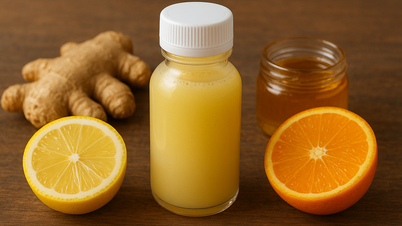
Ginger has many health benefits - Illustration photo
As an antibacterial, anti-inflammatory, and potentially anti-cancer agent, ginger has been studied for its effects on digestive disorders, arthritis, cancer, and various factors related to cardiovascular health. Ginger's antiemetic (nausea-reducing) effects may be beneficial for pregnant women, those experiencing motion sickness, and those undergoing anesthesia.
Rich in antioxidants
Ginger contains several bioactive compounds that contribute to its health-promoting effects, including:
- Gingerols and shogaols: These are the main compounds that give ginger its spicy flavor and are responsible for its health benefits.
- Paradols and zingerone: These compounds provide antioxidant, anti-bacterial, and anti-inflammatory benefits.
- Terpenoids and terpenes: Terpenoids may help remove damaged cells. Specific terpenes in ginger, such as limonene and linalool, have been studied for their potential neuroprotective (brain-protecting) abilities.
Relieves muscle aches and joint pain
Ginger is known for its anti-inflammatory properties, mainly due to the compounds gingerol and shogaol. Clinical trials have shown that ginger can help reduce muscle soreness after exercise.
Taking 2 grams of raw or heat-treated ginger daily may reduce inflammation caused by muscle wasting, while supplementing with 4 grams of ginger may speed muscle recovery after intense exercise.
Several studies have shown that ginger can help reduce the symptoms of arthritis.
Relieves digestive discomfort
Ginger can help relieve digestive upset. When used, ginger and its components work within the digestive tract to soothe the digestive organs.
These effects may help relieve symptoms such as bloating, pain, and nausea, often associated with a condition known as indigestion.
In a study of 51 patients with indigestion, participants who took two 540-milligram ginger supplements daily (one before lunch and one before dinner) for four weeks had significant improvements in symptoms such as feeling full after eating, abdominal pain, and heartburn.
Ginger may also help relieve symptoms of gastroesophageal reflux disease (GERD), also known as chronic acid reflux.
May improve blood flow
Ginger, specifically the compound 6-gingerol, has been studied for its effects on blood pressure. Research suggests that ginger may play a role in improving blood flow and regulating sodium levels. However, more clinical research is needed to confirm these findings.
Control blood sugar
Ginger may play a role in blood sugar control, preventing complications related to diabetes and heart disease.
Clinical trials show that ginger may help control blood sugar in people with type 2 diabetes. Daily ginger supplementation (1–3 grams per day) for several weeks improved fasting blood sugar (FBS) and HbA1c (a measure of blood sugar control).
Research shows that 6-gingerol may help regulate GLP-1 (glucagon-like peptide 1), a hormone that helps control blood sugar levels. GLP-1 aids in insulin release and promotes better glucose (sugar) uptake into muscles, which can improve energy levels.
However, more human trials are needed to support and better understand the effects of ginger on blood sugar control.
May aid in cholesterol control
Daily ginger supplementation may be beneficial for cholesterol control. Maintaining healthy cholesterol levels is a factor that may reduce the risk of heart disease.
A clinical trial in obese women with breast tumors (mastoid tumors) showed that ginger supplementation may reduce cholesterol and triglyceride levels.
Nutritional value of ginger root
The nutritional value of one cup of ginger can vary depending on the specific product, but 5 slices of fresh ginger (about 11 grams) provide:
Calories: 8.8
Protein: 0.2g
Fat: 0.08g
Sodium: 1.43mg
Carbohydrate: 1.96g
Fiber: 0.22g
Sugar: 0.187g
Ginger, like many plant foods, is packed with macronutrients (protein, fat, and carbohydrates) and contains a variety of vitamins and minerals, such as vitamin C.
However, the amount of vitamins and minerals in ginger root is very small. The potential nutritional and therapeutic benefits of ginger root are often linked to its bioactive compounds.
How much ginger should I use?
Ginger is generally considered safe to consume, but the U.S. Food and Drug Administration (FDA) recommends a maximum dose of 4 grams per day. Higher doses may cause stomach upset and acid reflux. Although allergies to the spice are rare, the enzyme cysteine proteinase GP-1 in ginger may cause an allergic reaction in some people.
Ginger is not recommended when taken with other blood thinners as it may increase the risk of bleeding. It may also increase the risk of hypoglycemia when taken with some diabetes medications.
If you are taking medication, consult your doctor before drinking ginger water daily or using other concentrated ginger products.
Source: https://tuoitre.vn/loi-ich-suc-khoe-cua-viec-dung-gung-hang-ngay-20241018152448626.htm



































































































![Dong Nai OCOP transition: [Part 2] Opening new distribution channel](https://vphoto.vietnam.vn/thumb/402x226/vietnam/resource/IMAGE/2025/11/09/1762655780766_4613-anh-1_20240803100041-nongnghiep-154608.jpeg)













Comment (0)